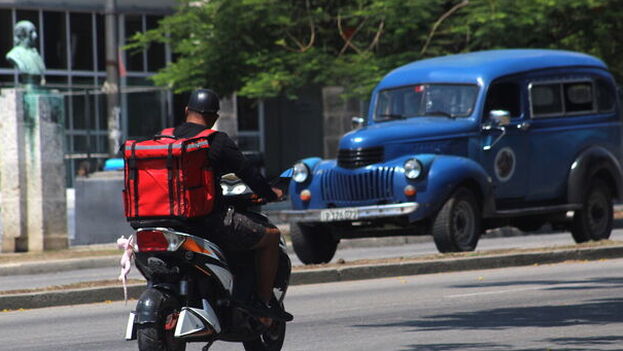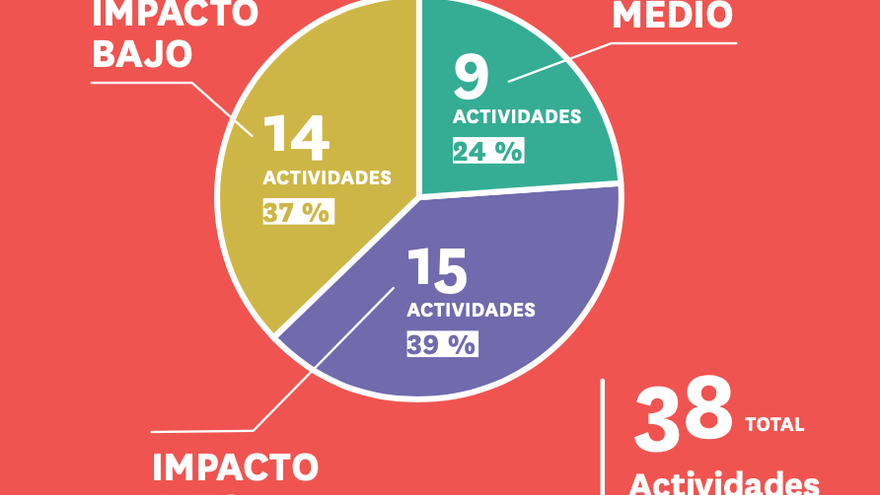
![]() 14ymedio, Marcelo Hernández, Havana, May 16, 2020 — Until six weeks ago Omara had a routine. She would get up early and start making breakfast for the tourists staying at her large house in Old Havana. Its six rooms, with bathroom included and a few yards from the Plaza de San Francisco, guaranteed she had her customers year round. But with the COVID-19 crisis the hostel “is as quiet a cemetery,” she laments.
14ymedio, Marcelo Hernández, Havana, May 16, 2020 — Until six weeks ago Omara had a routine. She would get up early and start making breakfast for the tourists staying at her large house in Old Havana. Its six rooms, with bathroom included and a few yards from the Plaza de San Francisco, guaranteed she had her customers year round. But with the COVID-19 crisis the hostel “is as quiet a cemetery,” she laments.
Her situation is similar to that of many small entrepreneurs and is reflected in a report just published by the consulting firm Auge, created about six years ago by four Cuban professionals. The document analyzes the effects of the pandemic on the private sector, describes the weak points for the coming months and suggests some measures authorities might take to help private businesses.
“Except for some slow periods, my income has been quite high in recent years. It was a rare week that I did not have at least three rooms occupied,” Omara tells 14ymedio. “I have no other options right now because those of us in the business of renting rooms to tourists cannot retool like some restaurants have done by providing home delivery.”
With the closure of the country’s borders and suspension of all foreign tourism, Omara has had to ask her employees not to come to work. “I paid them for the month of March, as though they were still working, because at this point we are almost like a family. But I cannot keep giving away money,” she explains. “I can only afford to pay for maintenance of the house so that things don’t deteriorate. I have to keep investing.”
Two maids, a cook and a custodian who guarded the entrance and took care of tourists’ cars parked outside are some of the workers who have lost their income. There is also the courier who delivered fruits, vegetables and other products used in preparing breakfasts and dinners. Even the local dance instructor, many of whose clients were Omara’s guests, has lost her job.
Since self-employment was legalized in the mid-1990s, a network of contacts, support and financial agreements have come to underpin the day-to-day life of small businesses. If the man who sells fish can no longer get his product from the dock to the restaurant, the number of items on the menu decreases and income drops. It’s that simple.

A report released by Auge, aptly titled “Private Entrepreneurship in Cuba: A Victim of COVID-19,” warns that the pandemic “can be considered the greatest threat that private entrepreneurship has had to face since the Cuban authorities decided in 2010 to allow self-employment.” It is a perception widely held throughout the private sector.
At the entrance of Mauro’s house in the Tenth of October neighborhood, the chairs have been placed on top of the tables and covered with plastic to prevent them from deteriorating from disuse. The bar is also protected by a wide nylon sheet. Three years ago, this 38-year-old entrepreneur opened a cafe that gradually became a small neighborhood restaurant with a an expansive menu featuring pork, chicken, pizzas and drinks.
“We tried to hang on and support ourselves by selling through a window to respect the public health measures for COVID-19 but in the end we had to close because we couldn’t buy what we needed,” he says. “The only way to maintain our operation right now would be to run the risk of buying provisions on the black market and we are not going to do that. I would rather do without necessities than end up in jail.”
In the absence of a wholesale market, self-employed workers have traditionally had to buy their products through a network of retail stores where, due to the coronavirus, quantities are now strictly regulated.” I spend hours in line and they only let me to buy one package of chicken or two of sausages. Who would think I could keep my business running like this?”
Auge’s report lists fourteen problems that have hit businesses hard. One of them specifically is the “shortage of raw materials. The loss of formal and informal ways to obtain supplies.” Even bleaker is the organization’s short-term forecast, which concludes that “in the next few weeks” many of the businesses that have managed to stay afloat so far will not be able to remain open.
“This is an industry based on sweat. No one is going to come to the gym because people are afraid of being infected by someone sweating and using the equipment nearby,” says Ramon, the owner of a gym on Belascoain Street in Central Havana. To make matters worse, his business is located in one of the areas under strictest quarantine due to the numerous positive cases of COVID-19 identified there.
“Early on we moved the machines further apart so customers could exercise without being so close to one another but it didn’t make much difference. At the moment anything that is not urgent or essential is not going to work as a business. Everyone is now prioritizing health care and finding food,” he adds. “Nobody wants to touch an exercise bike that was used by someone else a few minutes before, even though we make sure we clean it well.”
With the closure of Ramón’s gym, two trainers and a cleaning worker have lost their jobs, at least temporarily.
With the closure of Ramón’s gym, two trainers and a cleaning worker have lost their jobs, at least temporarily. The investments the owner was making to move into another space and renovate several pieces of equipment has been halted. The “interruption of investments to create new businesses or to expand existing ones” is another problem described in the Auge report.
In the midst of the uncertainty, Omara, Mauro and Ramon do not know what the future will bring in the short term. Nevertheless, they are not giving up and are looking for ways to save their businesses.
“My brother in Miami is willing to help by sending me new gym equipment, which would save me money that I could use to cover losses from those months,” says the gym’s owner. “But a treadmill or a dorsal exercise machine is not going to fit in a suitcase. It can only be imported commercially,” he admits.
This is precisely one of the measures Auge has suggested the government take to help the private sector: “Permit imports of a commercial nature after modifying the current customs regulations. Relax customs regulations on the importation of basic necessities.” Until now, the state has held a monopoly on commercial importing and exporting, which it does not seem willing to give up.
Another proposal in the Auge report is to “promote the use of foreign exchange in investment and job creation, and provide facilities for the digital implementation of business through preferential prices by [the state-owned telecommunication company] Etecsa.” Other proposals include granting a “tax truce,” eliminating taxes on the workforce and suspending tax collection.
Omara, the bed-and-breakfast owner, is bracing for “a long drought of customers.” That is also the conclusion of the researchers at Auge. They predict that many businesses will be “unable to resume operations” and that the inability to travel overseas will cut off the private sector from supplies such as cleaning products and ingredients used to prepare meals for tourists.
Mauro, however, is optimistic. He believes his small restaurant will be able to stay afloat once the nightmare ends.
Mauro, however, is optimistic. He believes his small restaurant will be able to stay afloat once the nightmare ends. “We might not be able to sell the same products as before — people will have changed — so I am thinking about switching to takeout, or to something more modest like a food stall that will serve more of a niche market after the pandemic.
Recently, Mauro posted announcements on various classified ad sites offering his services as a courier. “I have an electric motorcycle, can go anywhere and will make home deliveries of packages or food from other restaurants, though I do not wait in lines,” reads the ad. “It’s what I can do to survive and feed my family,” he tells 14ymedio. “When this is all over, I will try to reopen my business.”
Until that long-awaited moment comes, the chairs and tables will remain protected under their plastic.
_______________
COLLABORATE WITH OUR WORK: The 14ymedio team is committed to practicing serious journalism that reflects Cuba’s reality in all its depth. Thank you for joining us on this long journey. We invite you to continue supporting us by becoming a member of 14ymedio now. Together we can continue transforming journalism in Cuba.
